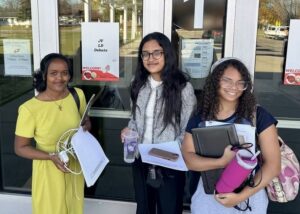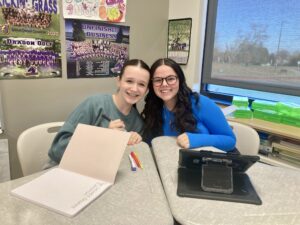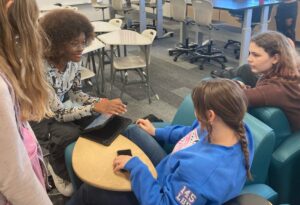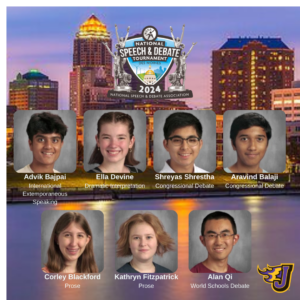Students think on their feet, develop confidence and critical thinking
By Cameron White, JCSD Communications Intern
JOHNSTON, IA. (Nov. 13, 2024) — Speech and debate season is well underway with the Bulldog Invitational  coming up in Bettendorf this weekend. But few people understand what’s involved in this activity.
coming up in Bettendorf this weekend. But few people understand what’s involved in this activity.
Both speech and debate have several types of events that students can participate in, all of which sharpen students’ public speaking skills.
“From my view, a good debate is fair and balanced, involves a lot of clash between the two sides, and is fun,” said debate captain Aravind Balaji. “Without all those three, it tends to be a bad debate.”
Thinking on their feet
Students compete in several types of debate, including:
- CON (congressional debate), which is a simulation of the actual U.S. Congress, where a group of students participates in a legislative session and debates various bills and issues.
- LD (Lincoln Douglas Debate), which is a student-to-student one-on-one debate, where students debate values and morality.
- PF (public forum), where students work with a partner to debate current issues and events, while having a very limited amount of time to prepare.
 A good debate is a well-researched and well-delivered presentation of information, said JHS teacher and coach Tyler Stough.
A good debate is a well-researched and well-delivered presentation of information, said JHS teacher and coach Tyler Stough.
“Another component of a good debate is how well the individual can think on their feet and provide meaningful refutation of points given by their opponent,” he said.
Public Forum is a popular type of debate that interests the majority of students.
“In this type of debate, they are in teams of two and they debate a resolution developed by the National Speech and Debate Association,” Stough explained. “They have to write cases both for and against the topic and then debate another team with whatever side is chosen before the round.”
Acting and interpreting
Speech is divided into two kinds of events: Interp Events and Public Address Events.
- Interp Events are where students perform a published written work selected from an online database.
- Public Address events are speeches written by the student delivering them to inform or entertain the audience.
Both DI (dramatic interpretation) and HI (humorous interpretation) are solo events where a student, without the aid of a set or props, must deliver a roughly 10-minute monologue of their choosing from memory. While DI and HI both involve elements of acting and interpretation, they can be very different.
“Humorous is supposed to make people laugh, and feel good about themselves, where dramatic pieces are supposed to hit you — they hit home for most people, they make you feel emotion,” said JHS senior Oliver VanWinkle.

“A good dramatic interpretation is a piece that speaks to the performer,” Stough said. “Many dramatic interpretation pieces are monologues based on what the story is for the 10 minutes a person has to perform it. Does the piece set up what is happening? Is there a good build towards the climax? Is the climax meaningful and delivered well? Is there a good resolution to it?”
Another popular form of Interp Events is DUO (duo interpretation), where two students recite a written work. But the catch is while they can be two seperate characters, they cannot look at, touch, or interact with one another.
Confidence and critical thinking skills
In selecting their event and script, speech and debate students look for what best fits them.
“One of the skills I want students to get out of this activity is the confidence to be themselves through the ability to 
Every student has their own process to prepare — whether that be performing a dramatic interpretation in front of a mirror, collaborating with a peer, or staying up to date and researching current events. Students spend many hours on practice, but still occasionally feel the pressure of public speaking.
“It’s all about mastering the fundamentals,” Balaji said. “Breathing deeply and visualizing what you’re going to do, the way you’re going to speak, and the counterarguments you’re going to make, that’s what keeps me calm.”
Leadership opportunities
Both sides of speech and debate are led by student captains. Lots of responsibilities fall on the captains to ensure successful performances.

Balaji heads a leadership council with students involved in different speech and debate events.
”I know I’m not always going to know everything about every event, but my job is to surround myself with those who do know,” he said. “My job is to take ownership of what the team’s doing. I’m there to rally the team to make sure everyone’s focused on our goal: being the best we can be.”
JHS has seen much success in speech and debate, and even co-hosted the national competition this past summer. Speech and debate students just returned from competing in Minnesota last weekend and have several upcoming competitions including ones in Bettendorf, Des Moines and Chicago.
Related Articles
Johnston hosts 2024 National Speech and Debate Tournament